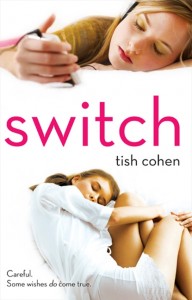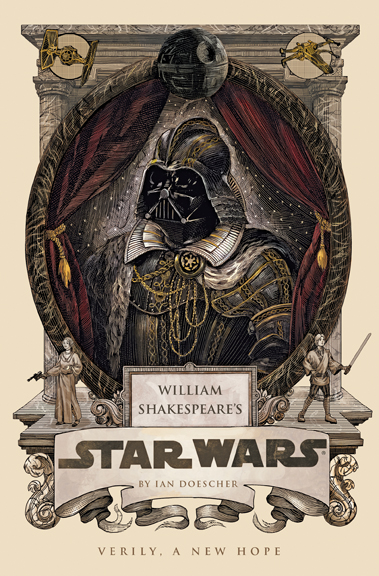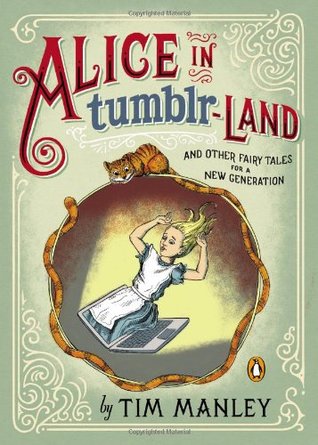
Review: Switch, by Tish Cohen
Good girl Andrea Birch is an honour-roll lifer — a Stanford-bound, mildly neurotic, high-strung twelfth-grader who just wants a bit more privacy. Oh, and perhaps a bit more of a social life. Or just a life in general. When the bad behaviour of Joules Adams, daughter of an internationally famous rock star, lands Andrea in detention, it’s the final straw. How come Joules, who breaks every rule and lives a life of luxury, always gets off so easy? Why does she have everything, while Andrea has nothing — not even her parent’s full attention? In a modern, hip take on the classic Freaky Friday story, Tish Cohen delivers a fresh look at wishing your life was someone else’s.
I’ve read Tish Cohen before — specifically Inside Out Girl, a story about a learning-disabled child and how she gains a new family — and she’s a nice author. I was mildly interested in Switch, and in any case needed to familiarise myself with books besides fantasy and science fiction, so I picked it up.
My initial reaction when I opened the page and started reading was “Oh dear”, because the book is written in the present-tense, a stylistic choice that has always bugged me. If this was a library book or if I’d been reading it in the book store, I would’ve been more likely to put it back on the shelf, but I had already bought it and didn’t want to put it down after reading only a paragraph, and so I read on. I was able to mostly ignore the present tense after a while, thankfully enough.
Andrea narrates the story in the first person, a style I find can be really well-suited to a story like this, provided it’s done well. My reaction to this use of it was mixed. On the one hand, we get a lot of insight into Andrea’s life and thoughts, which is key to understanding her point of view and allows for some good, strong character development. On the other hand, Andrea sometimes narrates a bit too much — especially during conversations, when there’s sometimes a couple of paragraphs between each line of dialogue and I was left wondering, “Is there a period of silence between their words and her reply? Why isn’t anyone bothered by this?” It made some conversations seem drawn out, unusually slow, and as it comes off as Andrea taking time out of every day life to think this all to herself, it makes us wonder why whatever action she’s narrating over — walking to a parking lot, say — is taking so long.
This ties in to the two final downsides of the novel: over-descriptiveness and redundancy. Andrea narrates a bit too much; we don’t need to know exactly what everyone’s wearing, especially when Andrea doesn’t put that into a separate sentence, making what she’s saying seem overly long and sometimes a little awkward. She thinks too much about little things and mentions at three points getting “depressed” about things that really shouldn’t matter (apparently janitors, unwed middle-aged men, and people unaware of the gum on the bottom of their shoe make her sad). Andrea will also sometimes describe things again after we’ve already learned about them and spends a bit too much time reiterating what she’s already told us or musing at length on philosophies she’s already gone over.
Despite this, the book had strong points, as well. The dialogue was very well written. It was possible to identify who was speaking based on how things were being said; Joules had a very Valley-Girl way of speaking, while Andrea tended to babble when she was nervous, and though she’s clearly intelligent and it comes through in her dialogue, Cohen doesn’t resort to the trick that so many American domestic comedy writers do — i.e., make her sound like she swallowed a dictionary; on the contrary, Andrea speaks like a normal teenager, although without as much slang, as befitting someone who doesn’t have many friends. The conversations, if we exclude the narration in between lines, flowed quite naturally and made quite a lot of sense, and really helped bring through a sense of the characters. The way everyone spoke helped show who they are, where they came from, and how they felt, and I felt it was very well done.
The main strength of the novel, however, was the character development. It seems at first like Joules is being a spoiled brat; with character development, and with more insight into her character, this perception starts to change. Andrea really does start off the book being a spoiled brat, and learns throughout the entire course of it just how good she has her life. It’s refreshing that both characters realise how good they have it, and that Andrea especially realises the universe doesn’t revolve around her. Most importantly, and this was really refreshing to read, Andrea realises that she was the one who had to make the change; that the lack of attention she thought her parents were giving her and the lack of privacy she felt made her life so horrible were nothing in comparison to how the real world worked, and that all this time she had been unfair to her family and those who loved her. Instead of supporting the delusion that everything revolves around the protagonist, Cohen sends teenaged readers the message that sometimes, you have it perfect, and really have no cause to complain.
I found overall the story was a step up from the average teen novel, and the protagonists better role models than you would normally find. Actions are put in context, and Cohen doesn’t try excusing her protagonists’ behaviour, instead deciding to use her characters’ mistakes and wrong-doings to give character growth and insights. Just because her protagonists are doing something does not make it okay, but the fact that they did something bad in the past is not good reason to demonise them completely if they make an honest effort to own up to it and atone for it. It was a very well done book, and brought out its central themes and aesops clearly. It’s worth a read for anyone interested in the genre and deserves a chance from anyone looking for a light read.
Overall rating: 4/5



